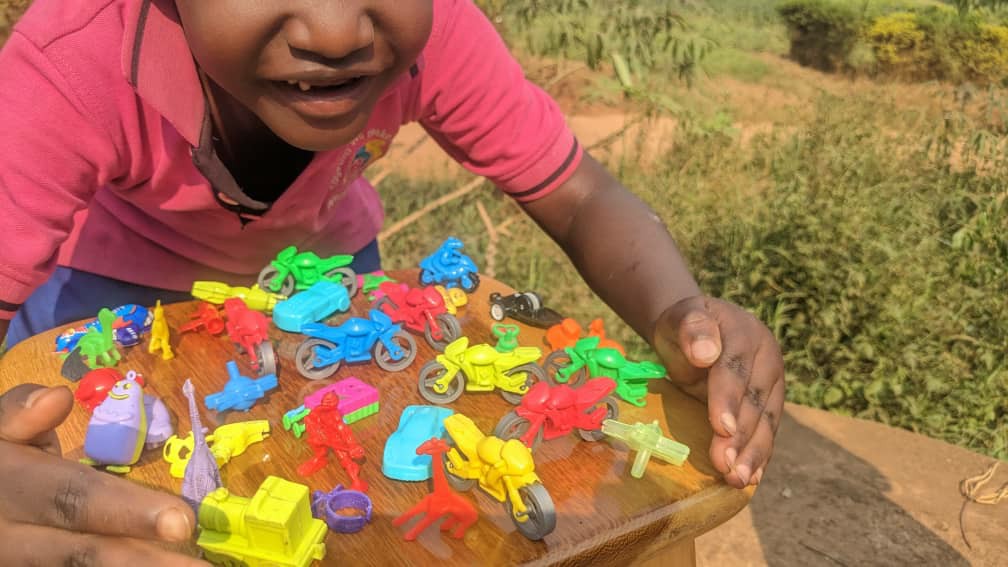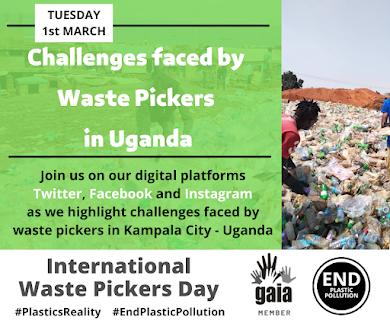Ahead of the coming INC-5.2, End Plastic Pollution been mobilizing young people to be aware of the plastics treaty process, share the plight of their communities as well as express the for a strong plastics treaty. Now in its “last” round of negotiations, the global plastics treaty has become of the most important moves by governments to address the problem of plastic pollution by unlocking systemic change to break the reliance on plastic. For countries in the global south, the plastics treaty comes at a time when many communities are becoming more insufficiently resilient to cope with increasing plastic pollution.
In Uganda, a 36 acre Kiteezi Landfill where most of the waste collected from Kampala City is dumped collapsed causing human deaths and massive property loss which left homeless in communities around the landfill. In addition many waste pickers families were affected, for some their children are now dropping out of school. Not forgetting an increased cost of decommissioning the landfill that has pushed the government to seek for loan. We cannot continue to see our human health put at risk, our soils and water sources intoxicated.
According to GAIA Africa Plastic Policy Factsheet, with an increase in Africa’s population, major economic transformation, rapid urbanization and changing consumer purchasing habits, there is reported increase in amounts of waste generated. Many governments and local communities are now facing the significant cost of inaction. Indiscriminate dumping of waste is also on the rise with 90% of waste generated in Africa dumped in unregulated sites with open burning, this is increasing the risk of diseases with expose to toxins, flooding and environmental pollution. Africa is currently responsible for only 5% plastic production and consumes 4% globally, yet the region continues to be severely affected by plastic pollution amidst the absence of strong measures to effectively address it.
The issue of waste colonialism cannot go unnoticed. The Africa region has become a dumping ground for end-to-end life goods, electronic waste and used clothes / textiles waste often from developed countries. This practice of exporting waste from higher-income countries in the global north to lower income counties in the global south under the excuse of recycling and charity is perpetuating the burden of toxic and non-recyclable waste on already strained resources, economies, infrastructure, worker’s rights and overall health of the environment.
“Today many Fast Moving Consumer Goods Companies are exercising double standards when it comes to taking responsibility to address the impacts of their plastic waste. Their sustainability campaigns like Coca-Cola’s world without waste initiative have failed. Pepsi on the other hand is investing to increase its production capacity with opening new plants. Others like Unilever are continuing to pump out massive quantities pf products packaged in single-use plastic sachets despite the company accepting the sachets are not proper packaging.” Says Namwanga Patricia of End Plastic Pollution Uganda.
“Plastic pollution knows no borders, no creed, no caste, no gender, no race, it affects us all, from ocean life to our lives. If we don’t stop the insidious nature of plastic, it will soon become the main ingredient of our grandchildren’s recipes. Our commitment to a plastic-free world is built on the promise of a cleaner, safer and healthier environment not just for the next generation but this generation too.” Quoting - Merissa Naidoo – Plastics Campaigner GAIA Africa.
Africa is now faced with an urgent need to address current waste management challenges and put the continent on sustainable pathway. Therefore as the youth of Africa we would like to re-affirm the call for a strong global plastics treaty as negotiations proceed to its final stages, all eyes are on our leaders to deliver on;
- Global plastic production reduction to protect human health, human rights and the environment.
- Identifying and regulating toxic and accessibility of waste pickers and frontline communities into national waste management policies and the global plastics treaty process.
- Harmonized standards and guidelines for environmental for environmentally, sound plastic waste management.
- Ending waste colonialism and dumping on the African continent.
- Strengthen standards and guidelines for extended producer responsibility.
- Robust financial mechanism to support the effective implementation of the treaty.
- Support the institution of a dedicated scientific body for the treaty.
Advocacy Dialogue on the UN Plastics Treaty – Amplifying Voices for a Global Plastic Future.
Ahead of the INC 5.2, End Plastic Pollution participated in the Global Week of Action event to discuss Uganda youth demands for a strong global plastics treaty.
The event held at Network for Active Citizens Uganda centered the discussion on how the UN Plastics Treaty can deliver on pressing issues concerning addressing the plastic waste crisis.
A panel discussion led by Green Africa Youth Organization had Joyce Gwokyalya from End Plastic Pollution. She discussed issues ranging from;
How the global plastics treaty is ought to deliver on an approach that addresses the entire life cycle of plastics from extraction of raw materials to disposal with focus on reducing plastic production.
Ensure binding commitments for countries to take action which is a departure from some previous agreements.
Ensure shared responsibility and global cooperation where countries come together to address a shared problem.
Among other issues raised by Joyce Gwokyalya while on the panel are;
The role of civil society and youth in monitoring treaty implementation at national level.
Enhancing policy dialogues with the government and other stake holders to ensure the effectiveness of the treaty.
Raising awareness, using digital media, mobilizing public support for treaty implementation.




